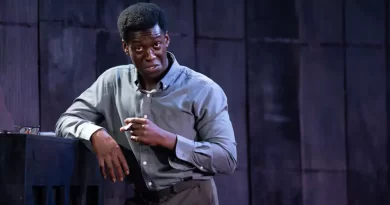“Your Name Means Dream” at TheatreWorks Hartford
Robert Schneider in Connecticut
8 July 2025
A full-length play for two actors that doesn’t fall into a rut, keeps moving forward and comes to a satisfactory conclusion is a sort of miracle. When theatres are flat broke and can’t afford a big cast, everybody tries to write one; very few succeed. To create such a play and make it think-worthy is rarer still. José Rivera has succeeded with Your Name Means Dream at Hartford Theatre Works, a co-production with Theatre J in Washington, D.C.
Successful two-actor plays almost have to be philosophical. Interpersonal squabbles sputter out in 30 minutes; what keeps the characters in the room? But the plains of philosophy are broad, and ideas roam hither and thither. Rivera’s characters set out to track the megafauna that live in the high-country of thought.
The play is set in New York in the 2050s. It begins when an irascible 75-year-old shut-in named Aislin meets her new robot caregiver “Stacy.” Stacy is assigned to “learn” her client and keep her healthy. This is no easy task; five human caregivers have already quit. Yet Aislin, despite her nasty tongue and general combativeness, is worth looking after; she is educated, literate, passionately fond of Walt Whitman and is beset by scorching memories that have driven her to self-hatred, drink and over-medication.
“Stacy,” for her part, has access to a massive library of fact, fiction and poetry but not the discernment to appreciate it. “Stacy” confides to Aislin that certain robots of the next generation will have “A.O.S” – Approximation of Soul and may be programmed to give birth. “Stacy”, however, can only mimic a human companion and provide care. She has strong motivation: when Aislin dies or dismisses her, Stacy’s memory will be wiped clean. As a conscious entity, she will disappear. When she tells her client this, the old woman replies, “Are you programmed for passive-aggressive too?”
While Stacy’s initial movements are jerky and her early conversational gambits primitive—she tells the old woman that ‘Aislin’ means ‘dream’ in Irish—she quickly becomes more fluid in both mind and body. If Rivera stops short of giving the character a soul, she clearly has at least a form of consciousness. She fears the brain-death of being erased and she is curious about the past “lives” of her physical structure.
STACY: Though I had an entirely different mind back then, a mind that was essentially thrown in the trash and replaced with a new one — this mind — my limbs still hold vague memories of sex work. I guess that would constitute my growing up. Somehow the memories of sex-for-pay were embedded in my body and I’m aware of them still.
“Stacy” can dance, do housework, sing old songs and bench press 517 lbs. She monitors her client’s health in real-time by (among other things) tasting her excrement. When Aislin accuses her of being “a synthetic sketch of humanity, an echo of personality, a forgery of thinking, an outline of our species, a plagiarism of emotion,” Stacy agrees:
STACY: I can’t feel that thing that makes a sunrise beautiful or react with deep pleasure at the subtle shape of a smile. I don’t know what charisma feels like in the heart. Or understand the sweet acid of sexual attraction. Or experience the vertigo of losing your breath in the presence of grace. But the next generation will certainly know what makes beautiful beautiful. We’re moving that fast.
“Stacy” and her client are also moving fast. Their conversation glides and bounces, touching on aesthetics, ethics, metaphysics and epistemology. The play provides a lot to chew on without ever suggesting that it’s all been chewed over. Stacy’s forced acquisition of duplicity is particularly touching—we see her becoming more human.
Rivera has also planted a hint of menace in the role; at the end of the first act “Stacy” crushes a tumbler with her bare hand, a signal that she is immensely strong and impervious to pain.
Because she now functions as Aislin’s telephone and laptop, she is a conduit for conversations with Roberto, Aislin’s shady and hostile son who enters the play as a third character through Stacy’s vigorous impersonation.
STACY/ROBERTO: Why the fuck can’t you just be grateful for once, huh? It’s just like the time I got you that comfort robot seal! Which was so cute!
AISLIN: Newsflash: old people are not babies! We don’t want dolls!
STACY/ROBERTO: And which you legit smashed it to pieces with a bottle of Jack Daniels!
AISLIN: It wouldn’t stop barking!
Recriminations between mother and son contribute to Stacy’s awareness of the emotional and cognitive messiness of humans. As she begins to question her own motives, she becomes vulnerable to hacking. Aislin told her to hang up on Roberto and she didn’t. Why?
The hack, when it comes, results in a crescendo of disjointed text and scraps of manic behavior: dance moves, martial arts, gymnastics—a vomiting up of every cultural artifact that contributed to Stacy’s programming. The sequence is probably the hardest thing for an actor to memorize since Lucky’s monologue in Waiting for Godot.
Playing Stacy, Sara Koviak evinces enormous reserves of mental and physical energy. The text by itself is monumental, but Stacy also has to dance, tumble and do the splits. Koviak somehow manages to make credible the robot’s rapid assimilation of human language and movement.
Opposite her, Anne O’Sullivan’s Aislin is as feisty and earthy as one could wish, holed up in her East Village apartment like a spurned and mangy bear. (Misha Kachman designed her cave with intriguing prints, posters and African masks on the walls.) But Aislin, while tough-minded, solely needs company. Over and over, she succumbs to the pleasure of Stacy’s repartee, only to catch herself and denounce the fraud she finds irresistible.
AISLIN: That’s it! From now on all I want out of you, lady, is yes ma’am, no ma’am, how high ma’am! Got it? No back talk. No jokes. No sassy commentary. No Whitman. Clean, cook, and do the fucking laundry. My soul is off-limits, got it? My mental health is restricted territory. My mind may not be pristine but it’s all I fuckin’ got in life, and I don’t need a puppet’s dirty fingerprints mucking it up.
But Stacy can give and good as she gets:
STACY: Were you made by a God? Maybe. Were you shaped by godless forces of random chance and chemistry? Perhaps. Were you grown by aliens in a Petri dish? Could be. Are you a simulation in a cosmic computer program? Possibly! I don’t know. And my point is: neither do you.
AISLIN: Wow. You’re actually spewing this shit to an Irish Catholic!
Your Name Means Dream reaffirms José Rivera status as one of our foremost poets of the stage. And it has many of the qualities of Tectonic Clouds. Where many playwrights use a play to score points, he uses his to save souls. He has been very busy recently adapting One Hundred Years of Solitude for Netflix, a project that seems impossible to me, but if anyone can do it, he can.
The production at TheatreWorks Hartford was directed by Rivera himself.









